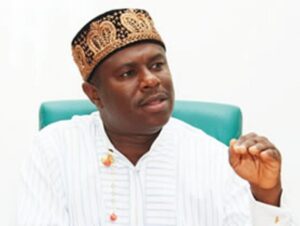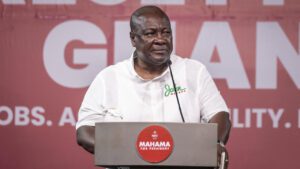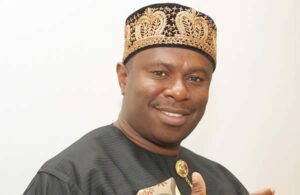Loopholes in the Proposed Electoral Act
By Dakuku Peterside
Traditional wrestling in the southern part of Nigeria is intriguing and exciting. To the uninitiated, it would appear there are no rules, but to those who understand it, there are standard rules that govern it. The electoral system in Nigeria is like the traditional wrestling common to most parts of Nigeria. To non-Nigerian observers , they can place a bet that rules do not govern elections, but to the politically discerning persons, they see rules governed by regulations observed in the breach. Everything Nigerian is unique, though often not properly documented as a model – Nigerian English, Nigerian Jollof rice, Nigerian movies, Nigerian democracy and maybe now Nigerian Electoral Act.
Free and fair elections are the bedrock of every functional democracy, ensuring that government authority derives from the will of the people . It is crucial to place rules and regulations that would guide the elections to ensure that elections are free and fair. These laws usually take into consideration,the socio-economic and political context of a particular environment. What would work in ‘Sokoto’ may not work in ‘Shokoto’. Agreed no laws are perfect, and none would completely curb electoral malpractices. Human beings, especially political actors, always have the ability and ingenuity to develop strategies to undermine a rule, however iron cast it looks. Subverting an election is not entirely an African or Third World thing.
Since the return to democratic rule in 1999, Nigeria has been experimenting with different sets of laws meant to enhance the process and credibility of our elections. The latest chapter of this tinkering is the proposed Electoral Act (Repeal and Re-Enactment) Bill 2020, currently in consideration at the National Assembly. There are speculations that the original recommendations of the Joint Technical Committee co-Chaired by Senator Kabiru Gaya of the INEC committee in Senate and Hon Aisha Dukku of Electoral Matters Committee in the House of Representatives, may have been tampered with, especially the provisions on electronic transmission of results and limits on political campaign finance .
According to some of the members of the Joint Technical Committee, the Committee , Clause 50(2) gave INEC the powers to determine the procedure for conducting election, including if chooses, electronic transmission of results. The members expressed shock, like the rest of the country, that its report was apparently tampered
with, and words inserted in the said Clause 50(2), that outrightlyoutlaws the transmission of election results byelectronic means. The disputed Clause 50(2) was now made to read as follows: “Voting at an election under this Bill shall be in accordance with the procedures determined by the commission, which may include electronic voting provided that the Commission shall not transmit results of the election by electronic means.”
The Southern Governors’ Forum, in its meeting held last week in Lagos, rejected the removal of electronic transmission of results clause from the Electoral Bill as well as the confirmation of exclusive jurisdiction in pre-election matters on the Federal High Court.
The electronic transmission of election results has been an issue in Nigeria’s elections for some time now. The opponents of this measure have cited, amongst other issues, the poor state of our infrastructure and the ability of hackers and fraudsters to manipulate results when they are transmitted electronically. They point out that the electronic voting process was never part of the Electoral Act of 2010 as amended and that even the card reader has never been part of the Act.
If the above insertion of the “strange” clause 50(2),outlawing electronic transmission of results, passes, the implication is that we are on a backward movement. The original idea behind INEC adopting electronic transmission of results, as seen in Edo elections, is to progress our electoral process to electronic voting. E-voting is no rocket science, and in this age of invention, we do not need to re- invent the wheel. Developed countries such as United Kingdom, France, Germany, Switzerland, and developing countries like India, Venezuela, and the Philippines have all adopted and are using the full compliments of e-voting. On the other hand, paper ballots, manual counting, manual collation, and hand carrying of results represent some of the most significant
challenges that have affected the sanctity of elections in our part of the world and made a mockery of democracy. It leads to a lot
of contestations and creates a dilemma as to whose result is original. e-compilation and e-transmission of results will strengthen our faith in the electoral system and, by extension, democracy. After all, the essence of democracy is the sanctity of votes. If the ballot is open to contestation, then it does not breed trust.
The contentious nature of our elections has made Nigerians question if it represents the wishes and aspirations of our people. Any act that further depletes trust in the electoral system is an invitation to anarchy and may lead to the death of democracy as we know it today. Due to contentions about the nature and authenticity of election results, the courts now play a more significant role in deciding who is the winner of an election, denying the people the right to free choice. In recent times in our country, the court gave some judgements that put people in office who, in the real sense, did not participate in the electoral process. A rejection of electronic transmission of results and a return to the manual transmission of results is a return to everything wrong with elections in Nigeria. For all we care, we might, as well, legalise electoral violence, ballot paper snatching, stuffing of ballot boxes, writing of results in individual homes and multiple results if we are to go back to manual and analogue electoral practices and processes.
The hue and cry of Nigerians over the purported attempt to exclude electronic voting and transmission of results from our electoral law have been deafening. And there is palpable fear amongst Nigerians that were this to succeed, it may mean that the 2023 general elections will be characterised by the flaws that have become the recurring decimal in Nigeria’s polls since 1999. Some Nigerians perceive it as an elite conspiracy to ensure Nigeria fails as a country.
I interprete the clause seeking to exclude electronic transmission of election results from the Electoral Bill 2020 as setting the grounds
for cheating in future elections, as we saw in some states in 2015 and 2019. If there is anything we owe the future generation of Nigerians, it is an electoral system representing their aspirations and allowing them to elect the kind of leaders they want. Nigeria should be on the same page with other civilised countries where electronic
transmission of results means that each stage of the electoral process is as transparent as possible. For most of us , even the accreditation of voters should be electronic to curb the ongoing issues of multiple voting or overvoting.
The second issue is the excessive monetisation of the electoral process. The proposal before National Assembly is to move the limit of campaign expenditure for presidency from
N5bn to N15bn , governorship from N1bn to N5bn ,Senate to N1.5b, House of Reps to N500m, State House of Assembly and Area Council Chairmanship to N50m. The real challenge is in monitoring of this expenditure cap and enforcement of the provisions of the law . A clear case of negative impact of monetization in our politics can be seen in the alleged bribery of INEC officials to the tune of N360m in the 2015 elections by a south – south Governor . He did this knowing fully well that these corrupt officials can easily manipulate the system to his advantage. If electronic electoral processes are adopted, these types of assault on our electoral system will be minimised, if not completely eliminated. For many Nigerians, some of the manual processes in our elections are susceptible to manipulation, so there should be electronic accreditation using the card reader backed by law , electronic counting of votes, electronic transmission, and electronic collation of results.
Another area of concern is the confirmation of exclusive jurisdiction in pre-election matters on the Federal High Court. Understandably, the proponents of this rule want to reduce election-related litigation for the interest of our political class and our courts, which are currently overstretched. Many politicians in Nigeria suffer from the double jeopardy of losing elections after spending so much but equally of bleeding cash through endless litigation. A critical look at this provision of the proposed amendment of the Electoral Act will conclusively show that leaving
jurisdiction on electoral matters,solely with the Federal High Court would not be the best for the country. It is a fact that most of the election cases in the country are time-bound and must be concluded within a brief time. So, when only the Federal High Courts are allowed to adjudicate on pre-election matters, we are likely to have an ugly situation where many cases would linger for a while whilst waiting to be taken care of within the short period. And if we put judges under undue pressure to give judgments to meet up with time, it leads to half-baked litigations and unsound pronouncements by the judges.
Also causing some rumpus in the proposed bill is the removal of INEC’s power to review results declared under duress or in contravention of electoral laws and guidelines as contained in section 65 of the proposed legislation. For many political analysts, INEC is to review results declared under duress to reduce the level of electoral malpractices that have become so common in our country, which demeans our electoral process and discredits our fledgling democracy.
This proposed clause in the legislation would require serious scrutiny as it has its pros and cons .Forcing an electoral official to declare result under duress is a criminal offense . The real challenge is in enforcement of laws against criminality . We had a case in the last election in Imo State where an INEC Returning Officer lamented before the press that a Senatorial candidate had allegedly kidnapped him and forced him to announce his ‘acceptable’ result. This example is deplorable and abhorrent.
To get it right and for our democracy to flourish, our laws should reflect the will of the people and strengthen our democratic process. Our leaders, especially our lawmakers, should realise that many laws they make today would go beyond their tenures, even their lifetimes. So, it becomes imperative that the process of law-making should be covertly and overtly patriotic and devoid of partisan, tribal or primordial sentiments. Like the wrestling in the southern part of Nigeria mentioned earlier, electoral engagement rules must be clear to all, both the initiated and uninitiated. Electronic voting and transmission of the results are necessary and should be added to the Electoral Act.




